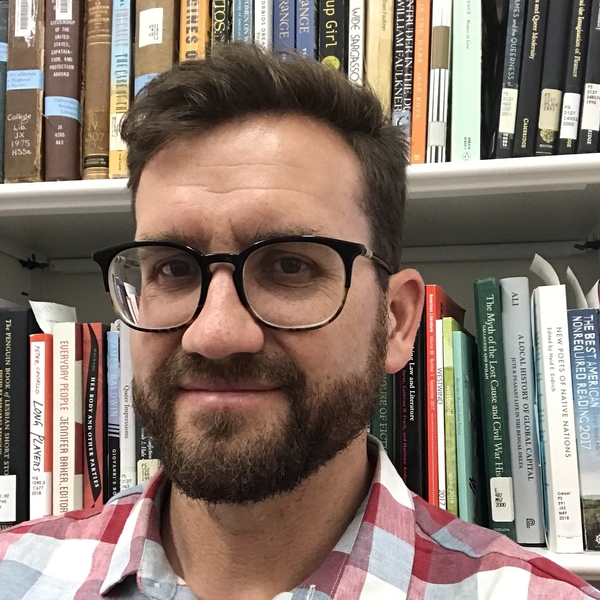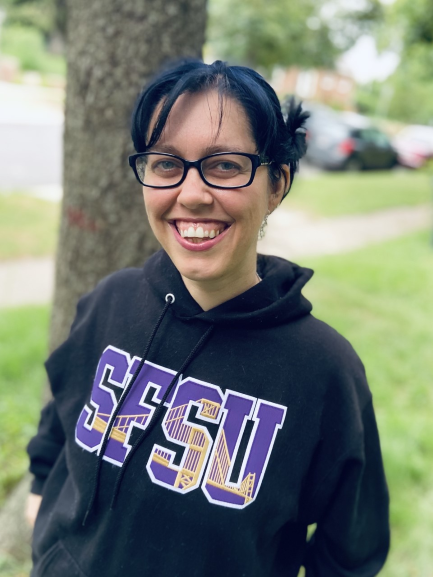
Interview With Incoming Literature Assistant Professor William Clark
Where are you from and why did you decide to continue your career at SF State?
My family moved often, but I’m from California and grew up mostly in San Diego. Since high school, I’ve spent my time moving between Los Angeles and the Bay Area. I’m so excited to return to California and to continue my career at SF State because it means returning to an area and community where I had my first career before I went to graduate school (I worked in the nonprofit sector then) and because SF State and the English Department have a social justice mission that I deeply admire.
Briefly, what would you consider your expertise in the field of English to be?
I work across a couple of interrelated fields — queer studies, law and literature, and studies in the novel. Across these, my work and my teaching look at how literature conceived of queer belonging and exclusion as queerness became a category of concern that U.S. culture and law regulated in new ways. So, I look at how queer literature expressed queerness — but also at how the U.S. legal system put pressure on that same form of expression.
What courses will you be teaching at State and do they relate to your research/interests?
One of the exciting things about joining a new institution is developing courses that complement what the Department offers and my own research and interests — so I look forward to figuring this out over time! But in the fall I’m teaching one of my favorite courses “What’s Queer About Gay Marriage? Radical Themes in Contemporary Queer Fiction, Film, and Criticism,” which focuses on queer art in the past 10 years to see how it moves beyond marriage equality to examine pressing issues facing queer communities now. I’ve taught versions of this course before and I’m excited to see what students at State will think of the texts we read. I’m also teaching a course on activist themes in the period of the so-called “American Renaissance” — a period between 1820-60 when American Literature became a thing in its own right. In the class, we’ll be looking at both traditional and peripheral texts that critique discourses of American equality and inclusion. This course is going to focus especially on the idea of citizenship—how it evolved and became increasingly restricted to white men in the first half of the 19th century. The course will force us to think about how ideologies developed in the 19th century have afterlives that impact social and civil rights movements all the way up to Black Lives Matter today.
What course are you most excited to teach at SF State?
This is a hard question! But I think of these I’m most excited to teach a course on queer literature and historiography that looks at how queerness has developed and changed in literature from the 19th century on.
What’s your favorite thing about being an English professor?
My favorite aspect is when a class helps me to see a text I am familiar with in an all new way. Working with students always brings new insights to texts and histories — and those moments when we all generate knew knowledge together make the classroom one of my favorite places to be — even if it’s on zoom!
What’s the most challenging aspect?
Some of the material we read is complicated conceptually and/or emotional in terms of topic, so it’s always a challenge to read the texts with fresh eyes and in ways that foster open discussion and vulnerability. But those challenges are also what make the texts worth reading.
We always ask for book recommendations. Is there anything you’ve read that we shouldn’t miss?
I always have a hard time with this question — there are so many possibilities. But recently I read Danez Smith’s new book of poems, Homie, and Cathy Park Hong’s new memoir/essay collection Minor Feelings. They were both excellent and I recommend them completely.
Interview With Incoming Composition Assistant Professor Virginia Schwarz
Welcome to SF State Dr. Schwarz! Where are you from and why did you decide to continue your career at SF State?
I am from San Diego, California. I graduated from San Diego State and California State University Long Beach, so working for a Cal State School and living in the Bay Area is a dream come true for me. I was also drawn to teach here because of the legacy of student activism and protests and the college of ethnic studies.
What would you consider your expertise in the field of English to be?
Let’s see, I study writing courses in higher education. I am interested in who teaches them, what curriculum they have, what kind of grading goes on, and how educators can work with students to make these spaces more meaningful, relevant, inclusive, and socially-just.
You’re an expert in contract grading, would you mind explaining a little about this practice?
Hahahaha. Expert is such a strange word. Contract grading is a kind of classroom assessment where teachers do not put individual grades on students’ papers (A-F, points, percentages, etc). Instead, students commit to earning a certain grade in the course and do a number of assignments throughout the term that add up to or constitute that grade. In writing courses, this means lots and lots of feedback and conversations instead of grades. Teachers sometimes call this “labor-based grading.” Many teachers who use this alternative assessment practice also involve students in the design of the course and curriculum.
What courses will you be teaching at State and do they relate to your research/interests?
I will be teaching first-year writing through Metro, yay!! These are my favorite writing classes to teach because students are new to college or to the campus, and it’s fun (and so so important) to connect them to the people and resources they will need to be successful. I also learn a lot from first-year students and appreciate the energy, enthusiasm, and knowledges folks bring to class discussions. I will also be working with graduate students in English 700, which is an introduction to the field and explores some of the central tensions about how writing should be taught.
We always ask for book recommendations. Is there anything you’ve read that we shouldn’t miss?
My favorite book right now, fiction wise, is Real Life by Brandon Taylor. I am also an academic book geek and love reading Sara Ahmed, Kevin Kumashiro, Carmen Kynard, Asao Inoue and Bettina Love.
